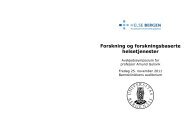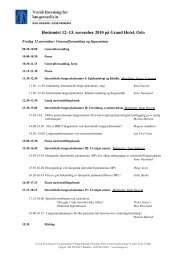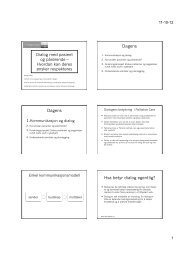Download it here
Download it here
Download it here
You also want an ePaper? Increase the reach of your titles
YUMPU automatically turns print PDFs into web optimized ePapers that Google loves.
23-27 August, 2011<br />
Friday 26 August 2011<br />
FRIDAY 26 AUGUST<br />
08.30 – 10.00 TRACK 1: BULLYING<br />
SYMPOSIUM<br />
NEW CONTEXTS OF VULNERABILITY AND PROTECTION IN SCHOOL BULLYING:<br />
THE INDIVIDUAL, TECHNOLOGY AND INTERVENTION<br />
Peer Gynt<br />
Chair: Kevin van der Meulen<br />
Discussant: Yuichi Toda<br />
S16 S16.1 Prevalence of bullying in secondary school by SEN type: Secondary analysis of<br />
combined NPD and LSYPE data files<br />
Paul Naylor*, Eric Emerson, Jeremy Dawson, Digby Tantam, & Laura Lara<br />
S16.2 Cyberbullying among Spanish secondary school students: data from a preliminary<br />
national survey<br />
Cristina del Barrio*, MJ. de Dios, I. Montero, E. Martín, E. Ochaíta, E. Espinosa, H.<br />
Gutiérrez & A. Barrios<br />
S16.3 An Anti-Bullying Intervention In Schools: Cross-National Comparative Evaluation of<br />
the PEPE project In England & Spain<br />
Kevin van der Meulen*, Paul Naylor, & Cristina del Barrio<br />
08.30 – 10.00 TRACK 2: COGNITIVE AND LANGUAGE DEVELOPMENT<br />
SYMPOSIUM<br />
MEMORY IN INFANCY AND CHILDHOOD: NEW FINDINGS FROM EXPERIMENTAL,<br />
LONGITUDINAL AND ELECTROPHYSIOLOGICAL DEFERRED IMITATION STUDIES<br />
Klokkeklang<br />
Chair: Thorsten Kolling<br />
Discussant: Monika Knopf<br />
S17 S17.1 Flexibil<strong>it</strong>y of early memories: Deferred im<strong>it</strong>ation in two s<strong>it</strong>uations w<strong>it</strong>h change of<br />
contextual relevance<br />
Ildikó Király*, Dora Kampis, Kata Krekó, & József Topál<br />
S17.2 Episodic memory development: Self-moderated stabil<strong>it</strong>ies of deferred im<strong>it</strong>ation<br />
performance through the second year<br />
Thorsten Kolling*, Claudia Goertz & Monika Knopf<br />
S17.3 Further exploration into the infant’s mind: Early memory, individual differences and<br />
electrophysiological correlates<br />
Mikael Heimann*, Emelie Nordqvist, & Tomas Tjus<br />
08.30 – 10.00 TRACK 3: INFANTS AND PSYCHOBIOLOGICAL DEVELOPMENT<br />
INVITED<br />
SYMPOSIUM<br />
WHERE DEVELOPMENTAL PROGRAMMING STARTS: EVIDENCE FROM FETUS,<br />
INFANT AND CHILD BRAIN BEHAVIOUR STUDIES<br />
Troldtog<br />
Chair: Bea Van den Bergh<br />
IS8 IS8.1 W<strong>here</strong> developmental programming starts: evidence from fetus, infant and child<br />
brain-behaviour studies<br />
Bea Van den Bergh*<br />
IS8.2 Is t<strong>here</strong> evidence of the development of fetal facial expressions<br />
Brian Francis, Nadja Reissland*, & Karen Lincoln<br />
IS8.3 Effects of placental insufficiency on fetal and infant aud<strong>it</strong>ory processing:<br />
Implications for language learning<br />
Barbara S. Kisilevsky* Sylvia M.J. Hains, & Gregory A.L. Davies<br />
IS8.4 Developmental programming: the association between prenatal maternal anxiety<br />
w<strong>it</strong>h cogn<strong>it</strong>ion and behaviour at (pre)school age<br />
Eva M. Loomans*, Odin van der Stelt, Manon van Eijsden, Tanja Vrijkotte, Reinoud<br />
Gemke, & Bea Van den Bergh<br />
IS8.5 Effects of prenatal malnutr<strong>it</strong>ion, stress and glucocorticoid treatment on functional<br />
brain development in utero and postnatally<br />
Matthias Schwab*<br />
56







